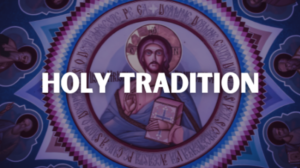The Sacred Scriptures (Holy Bible) are a part of the Sacred/Holy Traditions

The teachings of the Church are derived from two sources: Sacred Scripture and Holy Tradition. The Church is the pillar and foundation of truth (1 Tim. 3: 15). The Holy Church was founded first and it is within the Church there evolved both oral as well as written traditions. Many think and erroneously believe that Holy Traditions refer to traditions of men, in direct contrast to the Holy Scriptures. The Oral Word, preceded the written word. The Oral Word is the Sacred Traditions and the written word that came out
It is generally accepted that the Law of Moses was written around the 14th Century B.C. now all that was written about the teachings, commandments, and events about the people preceding Moses was undoubtedly transmitted as oral teachings from one generation to the next. Similarly the first Gospel (St. Mark) and other books of the New Testament were written during the period, A.D. 55 to A.D. 125. Before this the New Testament messages were transferred only through the oral traditions. Christ did not write any book nor did He command to write a book. The Apostles and the early Christians preserved the teaching and words of Christ and kept them alive by Oral Traditions. It was from the memory notes of the Apostles that the written traditions originated.
As written in the Gospel of St. John, “And there are also many other things which Jesus did, if every one of them were written down, I suppose that even the whole world would not contain the books that should be written” (Jn. 21: 25). All activities of Jesus were not written down (Jn. 20: 30). The roots and the foundations of this sacred tradition can be found in the Scriptures. But all the writings of the apostles were not recorded in the Holy Bible:
- The letter to Laodocieans seems to missing or lost (Col. 4: 16).
- Apostle John wanted to say few things which is not recorded in the Epistles (2 Jn. 12; 3 Jn. 13).
- The directions St. Paul gave to the Corinthians is not recorded (1 Cor. 11: 34).
- The story of Prophet Iddo is not mentioned in the Holy Bible (2 Chron. 13: 22).
- The prophecy which is fulfilled that Jesus will be called a Nazarene is not listed in the O. T. (Matt. 2: 23).
- The event of Moses burial (Jude 9) and Enoch prophecy (Jude 14) is also not mentioned in the O. T.).
So the Holy Scriptures alone cannot be the basis of Christian faith. The Orthodox Church carefully guards the truth against all error and schism both to protect its flock and to glorify Christ whose body the Church is. In theological terms it means any teaching or practice which has been transmitted from generation to generation throughout the life of the Church. More exactly, paradosis is the very life of the Holy Trinity as it has been revealed by Christ Himself and testified by the Holy Spirit.
Tradition of the Church was founded when the early Christians assembled on the first day of the week and devoted themselves to Apostle’s teachings, to breaking of Bread fellowship and prayers (Acts 2: 42). This practice was the basis for the catechumen and canon which followed and came later. The Apostolic Tradition, encompasses what the Apostles lived, what they saw, what they witnessed and later recorded in the books of the New Testament. The Holy church existed even before the Holy Bible was formulated, so we are obliged to obey the commandments of Apostles, and their disciples both in the written (scriptures) and oral form (that which was nurtured and guided orally). The Apostles persevered and witnessed the truth, which they learnt from Jesus Christ. Some of the activities and sayings of Christ the Apostles wrote it and were put together in the New Testament. So, the Holy Bible is a part of the Holy Tradition of the Holy Church. The bishops and presbyters, whom the Apostles appointed as their successors, followed their teaching to the letter. Those who deviated from this apostolic teaching were cut off from the Church, and were considered heretics and schismatics, for they believed differently from the Apostles and their successors, thus separating themselves from the Church. This brings into focus the Church as the center of unity of all Christians. This is the ecclesiastical or ecclesiological characteristic of Tradition.
The Church has declared that the Holy Scriptures, both the Old and New Testaments are the inspired, authoritative and authentic embodiments of the Holy Tradition of the Church. This is a living tradition, transferred from place to place and generation to generation under the guidance of the Holy Spirit. It has been recorded in the Bible, in the decisions of the Ecumenical Councils, in the writings of the church fathers, in the whole life of the Church. The holy Church condemns the tradition of men but call us to follow Apostolic or Holy Tradition.
0 Comments